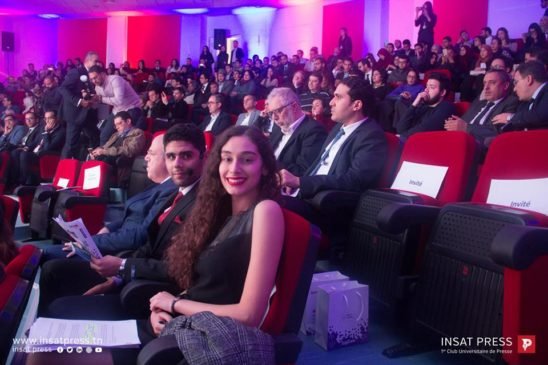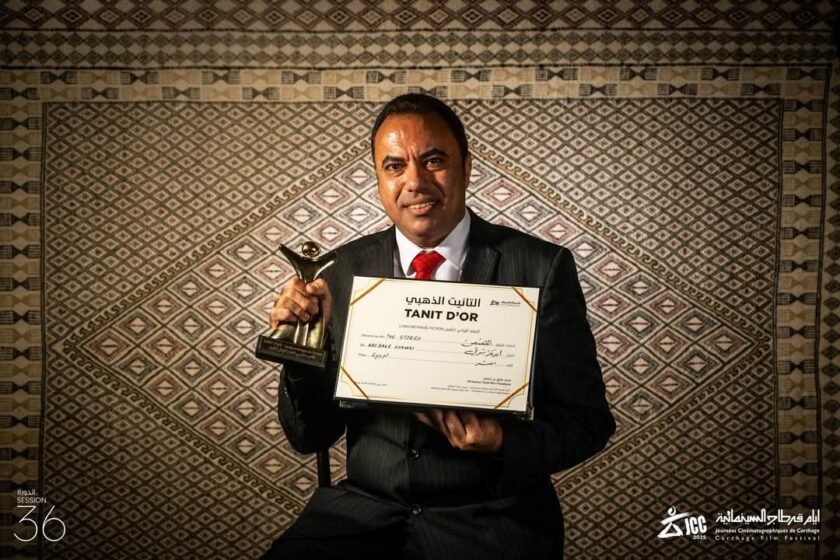The 19th edition of the SUP’COM Forum was held on Wednesday December 12, 2019 in the Tunis Higher School of Communication (SUP’COM) on the theme “Digital Tunisia: A Law for the Future” with attendance of eminent figures from the area of digital communication including Minister of Communication Technologies and Digital Economy Mohamed Anouar Maarouf as well as students in communication.
The forum provided the opportunity to promote digital culture and innovation and an occasion for the exchange of ideas and knowledge for young students, graduates, companies and professors.
This annual meeting, which this year coincides with the celebration of the 20th anniversary of the creation of Sup’Com , is a tradition established for 19 years and an opportunity for the promotion of the digital culture and innovation in the ICT fields.
It is also an exclusive meeting between young students, graduates academics, and professionals for exchange of expertise in the digital field.
The agenda of the forum includes three different sessions:
-The draft digital code: Foundations and global choices
-Digital Economy: Presentation of current and future European regulations
– Reading of the mobile industry of the draft code.
Opening the event, Director of Sup’Com Sofience Cherif said that this year the forum is interested in the new digital code which is a focus of a consultation by means of round tables and lectures to reach a common agreement on the drafting of this code.
This code is considered by the National Strategic Plan Digital Tunisia 2020 as the social and economic vector of Tunisia, he said, underlining that this is an occasion to boost the institutional framework of the digital institutions in Tunisia.

Sofiene Cherif also highlighted the importance of the digital transformation in Tunisia in order to bolster entrepreneurship, and apprenticeship so as to reach the goal of a global digital development.
In turn, former and first Director of Sup’com Mohamed Naceur Ammar, who had been the founding director of the Higher School of Communications of Tunis (Sup’Com) from 1998 to 2004, then director of Sup’Com again since 2007 until 2010, gave a historical overview of the communication sector in Tunisia.
He asserted that the Higher School of Communications of Tunis (Sup’Com) is one of the most prestigious engineering and research schools in Tunisia which is characterized by the high level of training and excellence of its faculty and laboratories.
Existing since 1973, SUP’COM was called “School of Posts and Telecommunications of Tunis”, Mohamed Naceur Ammar said.
He noted that it was meant for the specialized training of the managers of the sectors of the Posts and Telecommunications.
In 1993, the school was called the “Higher School of Post and Telecommunications of Tunis (ESPTT)”.
Following a reform in 1998, the ESPTT was replaced by the current Higher School of Communications of Tunis (Sup’Com), he said.
In her address, Rector of the University of Carthage Olfa Ben Ouda Sioud said that Sup’Com is among the best schools in Tunisia due to the added value on the level of the quality of the students and the commitment of the professors in fulfilling their mission in guiding their students.
She voiced pride that Sup’Com had a strategic choice by being very close to the enterprise which in turn is always present and has a good rate of integration in the job market. But there is a lot of mismatching, she deplored on the level of the universities and on level of the enterprises.
Now we have skilled students who are excellent on the technical plan but are unfortunately rejected by the enterprises. However when they go abroad they excel, she added.
The Rector of the University of Carthage affirmed that the new student generation has tremendous skills but they are different.“ We need to highlight this difference” she called underlining that the young generation have skills that the older generation did not have.
We need to reform the university so as to invest much more in the quality of the university and academic institutions, she concluded.
Taking the floor, Minister of Communication Technologies and Digital Economy Mohamed Anouar Maarouf talked about the opportunities provided for young people.
He said that today we have a great opportunity for the digital code which requires the participation of all the stakeholders in the digital field including experts, academics and even students, noting that Sup’Com has a whole programme to take part in the drafting of the digital code.
In this connection, the most important challenge raised is how to create the added value of the digital sector, he underlined, placing emphasis that the first aim of the strategic plan is to double the added value of the digital sector by contributing to the national economy.
This could be possible only through hard work and creating opportunities while opting for the revitalization of the digital system, he went on saying.
The most important lever is legislation in order to make sure that the code goes through a global reform approach Mohamed Anouar Maarouf said, noting that the code must be part of the reform process and with a focus on the institutional level.
It is worth reminding that a new reform has emerged and has recently been materialized into a draft of the new code, published by the Ministry of Communication Technologies and Digital Economy in October 2018.
The aim is to better fit with global developments and contribute to economic growth through the strengthening of telecommunication infrastructure, digital administration and online services, strengthening of technology services and trade in all areas and finally positioning of Tunisia as a regional hub in the field of telecommunications.
TunisianMonitorOnline (MNHN)




